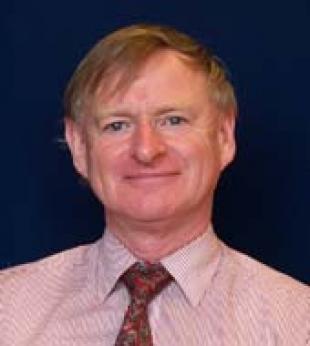Email:
Telephone:
Location:
Personal Page:
Academic Qualifications:
- 1962-1966 Heriot-Watt University, Edinburgh BSc (Hons), 2nd year class medal
- 1972-1975 PhD University of Edinburgh "The Design of Surface Acoustic Wave Filters and Applications in Future Communication Systems"
- Honorary DEng, Heriot-Watt University
- Honorary DEng, Edinburgh Napier University
Professional Qualifications and Memberships:
- Fellow Royal Academy of Engineering (FREng)
- Fellow Institution Engineering and Technology (FIET)
- Eurasip Fellow
- Fellow Royal Society of Edinburgh (FRSE)
- Fellow IEEE
- Honorary Professorial Fellow Head School of Engineering and Electronics, 2002-2007
- Regius Professor of Engineering 2007 - 2009
- Professor of Electronic Signal Processing to 2007
- University Curator of Patronage, 2003-2006
- International Professional Awards and Recognition Faraday Medal, Institution of Electrical Engineers (IEE), 2004
- Fellow of Institute of Electrical and Electronics Engineers, New York (FIEEE)
- IEEE Signal Processing Society distinguished lecturer on DSP for Mobile Communications, 1998
- President, European Association for Signal, Speech and Image Processing (EURASIP), 2000-2002
- National Professional Fellowships Fellow of Royal Academy of Engineering (FREng)
- Fellow of Royal Society of Edinburgh (FRSE).
- Fellow of Institution of Electrical Engineers, London (FIEE)
- Committee Chairs Electronics and Electrical Engineering Panel for the 2001 UK research assessment exercise (RAE)
- Royal Society of Edinburgh Electronics and Electrical Engineering Sectional Committee, 1999-2003
- Mechanisms for Excellence group of the Scottish Science Advisory Committee, 2002-date
- Proceedings IEE Editorial Advisory Panel, IEE 1990-98
- Editorial Advisory Panel, IEE Electronics and Communications Engineering Journal, 1996-2002
- EPSRC Communications Signal Processing and Coding programme, assessment 1993-95 and monitoring panels 1996-97
- Conference Committee Chairs Technical programme, IEEE International Conference on Acoustics Speech and Signal Processing (ICASSP), Glasgow in May 1989
- European Signal Processing conference (EUSIPCO 94), Edinburgh
- Paper Premia Awards Bulgin premium, Institution of Electronic and Radio Engineers (IERE) in 1974 and again in 1977
- IERE Lord Mountbatten premium in 1982
- IEE Marconi premium 1992
- IEE J Langham Thompson premium 1992
- Commercial activities Executive Committee, Mobile Virtual Centre of Excellence in Mobile and Personal Communications, 2002-2004
- Board Member, Mobile Virtual Centre of Excellence in Mobile and Personal Communications, 1997-date
- Independent Member, Strategic Advisory Board to the UK Defence Technology Centre in Electromagnetic Remote Sensing, 2003-date
- Board Member of Edinburgh Technology Transfer Centre, 2003-date
Research Interests:
Prof Peter Grant's primary interests are applying signal and information processing techniques for application in communication and radar systems. He has a continuing interest in the research he conducted during the 1970s on military spread spectrum communication and electronic support measures equipment for the gathering, analysis, sorting and classification of electronic signals.
Most of his research has been stimulated by electronic systems requirements and he maintains regular contact with many civil service and private industrial research and development laboratories.
Initially, his research interests were in SAW devices and in particular programmable analogue matched filters, employing hybrid microelectronic switching matrices, for detecting phase coded waveforms. He pioneered the application of these programmable devices as spread spectrum communication receivers.
He also made significant contributions to the design of SAW discrete Fourier transform processors, for the realisation of fast, coherent, frequency hopped waveform synthesisers, and investigated their application to wideband signal analysis. These processors, which were more compact than digital processors, were used as low power, wideband spectrum analysers for signal intercept and for FSK detection in satellite communication systems.
Throughout the 1980s he initiated and supervised studies on the design of digital adaptive filters. This covered the use of linear tapped transversal, lattice, frequency domain "fast convolution" and neural network based nonlinear equaliser techniques. This latter work has investigated both Volterra series and radial basis function (RBF) structures. The work on adaptive RBF structures provides quantifiable and significant performance improvements over linear adaptive filters and this fact has been recognised by a premium award, reprinting of his published results in research monographs and regular citations.
These supervised studies on linear and nonlinear adaptive filter based receivers have widespread applications in interference cancellation and equalisation for communications systems ranging from speechband data modems, spread spectrum systems, to line of sight digital microwave radio-relay equipments. This was recognised by the award of the IEE 2004 Faraday Medal.
With the resurgence of interest in civilian spread spectrum or code division multiple access (CDMA) systems he instigated the investigation of new receiver designs. These offer increased subscriber capacity through adaptive interference cancellation, and achieve improved performance in multipath propagation scenarios, through receiver adaptive filtering and array processing.
The Edinburgh group is recognised internationally for its pioneering contributions on CDMA multi-user detection techniques as they were one of the first groups to investigate this technique through the design of signal dependent (adaptive) receivers. Also their contributions to cellular basestation array processing, through the use of advanced DSP techniques for reducing the spatial interference, are internationally recognised.
For full CV see: http://www.homepages.ed.ac.uk/pmg/cv.html
Further Information:
- Personal web pages see: http://www.homepages.ed.ac.uk/pmg



